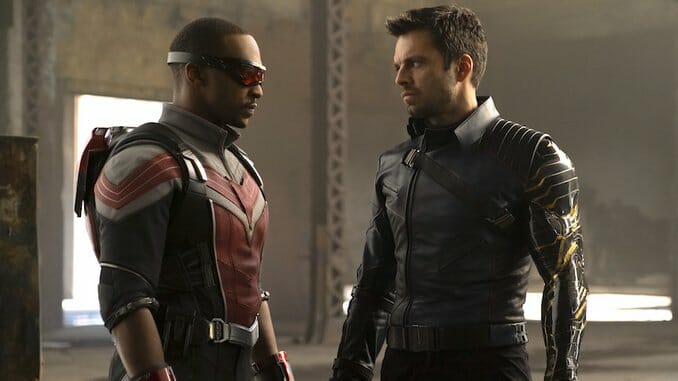The Falcon and the Winter Soldier Premiere: Marvel’s Call of Duty
Photo Courtesy of Disney+ TV Reviews The Falcon and The Winter Soldier
The opening sequence of Disney+’s latest post-Endgame Marvel Cinematic Universe TV series is a jargon-soaked murder montage. Within the first five minutes, we see a man’s neck snapped, someone shot through the head, a helicopter of people blown up, and more—all perpetrated by Sam (Anthony Mackie), a.k.a. Falcon, on behalf of the U.S. military. The actions are celebrated as a triumph, because he saved one of our own.
Despite the cinematic quality of this action set piece, which will no doubt thrill certain fans who missed that level of visceral destruction in WandaVision, this brutality is by far the least interesting thing that The Falcon and the Winter Soldier does in its first hour (or rather, 48 minutes, which is all that was provided in advance to critics).
Bucky Barnes (Sebastian Stan), the former Winter Soldier, also gets a scene of him committing a point-blank execution for his intro, and yet, TFATWS (as it shall henceforth be known) almost immediately ports us to his current therapy session. He’s haunted by the atrocities he committed as the Winter Soldier, and is working on making amends. That takes different forms; in some cases, he shows up to terrify former associates before handing them over to the Department of Justice. In other cases, he quietly befriends those whose family members were affected by his sleeper-agent past.
The two Avenger frenemies don’t meet in the premiere, but it’s surely only a matter of time before they team up again. After all, there is a new anarchic group, the Flag Smashers, who think life was better during the Blip (i.e. when Thanos wiped out half the universe’s population), and want to return to a time of unity and open borders.
But again, this is all much less interesting than the fact that the Blip, for Sam and Bucky, acts as a kind of extended military tour of duty. Sam is trying to reconnect with his widowed sister and her sons, and save his family’s fishing business. When they go to apply for a loan, there’s a cheeky reference to “how do [the Avengers] make money?” with no good answer. “Isn’t there some kind of Hero’s Fund?” the loan officer asks. This and the general hesitation for the loan to be approved feels like a not-so-coded reference to very real issues and biases faced by veterans, especially BIPOC veterans. Meanwhile, Bucky’s issues are largely internal. He isn’t in financial trouble, but he has no friends or family. When his therapist tells him that he’s free now, he answers “to do what?” He’s 106 years old, has no history and no life, and finds the modern world overwhelming and alienating.
This is where TFATWS really shines, by using Avengers as an analogue to dive into issues of PTSD and much more, the kinds of smaller human stories that WandaVision also—underneath all of its flair—was primarily interested in. As of this first episode, though, TFATWS still has a ways to go with it. The fight scenes that kick things off are brutal, and feel a lot more aggressively violent than what we’ve seen in the MCU thus far. While it works in terms of Bucky’s trauma, it doesn’t when Sam, our supposed hero, just brushes it off.
The question of heroes, like the shadow of Steve Rogers’ Captain America, looms large. Once Captain America retired from the Avengers and was laid to eternal rest, the major question was: Who would take up the mantle next? The only two contenders in fans’ minds were Bucky and Sam, both of whom come with a number of pros and cons. Primarily, though, neither character has had the opportunity to make much of an impression in the movie-verse so far, and perhaps TFATWS is a way to build one (or both?) of them up enough to wield the iconic shield. And yet, TFATWS also introduces a third way, one that feels quite a bit like Captain America: The First Avenger, which is that the answer to that question of legacy is less about who deserves it and more about who the United States can jingoistically use.
Whereas Wanda Maximoff was ensconced in her own world, TFATWS is very firmly in our own. (It also presupposes a much deeper knowledge of the Marvel movies than Wanda did, with lots of casual references to them and a lack of introduction for anyone else.) Tonally it’s along the lines of The Winter Soldier and the start of Civil War, at least regarding political jockeying and America-centric military issues. That’s both good and bad. On the one hand, the series could delve into some very worthy considerations of what it means to serve, to come home, to feel unmoored by a world that has moved past you; it could even reach Wanda-levels of introspection and emotional resonance regarding consequence. On the other, it could devolve into more of how this first episode starts: Call of Duty-esque mumbo jumbo, murder, explosions. That vibe has its place (like, say, innumerable blockbusters and more than a handful of network TV shows). But six episodes is not a lot of time to spend time doing both, at least not well. The Falcon and the Winter Soldier will need to pick a side: for America’s sake, I hope it’s the right one.
The Falcon and the Winter Soldier premieres Friday, March 19th on Disney+
Allison Keene is the TV Editor of Paste Magazine. For more television talk, pop culture chat and general japery, you can follow her @keeneTV
For all the latest TV news, reviews, lists and features, follow @Paste_TV.